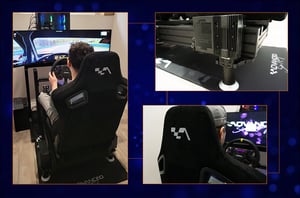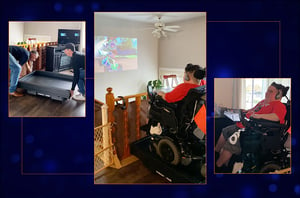Can you give me more information about the EVO2030 program?
EVO2030 is a blitz program that accompanies companies at all levels—whether they’re just starting in sustainable development or are more advanced—that helps us to diagnose the efficiency of a company’s operations and of their environmental performance.
With this diagnosis, we can then create a strategic plan to take concrete & efficient actions by the year 2030. This plan provides the company with quick wins to get results, but also with the tools necessary to create a governance of sustainable development for the long-term.
For example, at D-BOX there was a small spark created somewhere inside the company that grew into wanting to be greener and to partake in more sustainable development. Coesio then offered our company’s support to help D-BOX solidify their ideas of wanting to improve by creating a committee of sustainable development and by helping them create a strategic plan rather quickly by consulting with senior management.
At its core, EVO2030 is really a governance structure to ensure companies move forward and never put sustainable development to the side; being sure to always integrate sustainable solutions in their reflections—it’s about having a 360-degree vision of sustainability.
What are the core & common pillars of the EVO2030 program?
Basically, if we take a step back, sustainable development includes four major themes: we’ll of course talk about the environment, but also about the position of the company in relation to society and in relation to the well-being of the employees. Then we have to ask ourselves, how can a company create this approach in a way that will allow them to remain profitable?
As a last step, you have to find a way to structure your organization and remain sustainable over time through its governance. So, naturally, the four main themes of the EVO2030 program are: environment & economic, social, and governance (ESG).
Are there any trends that you see with ESG programs from company to company that stand out?
The main trend is that more and more companies are launching ESG & social responsibility programs. Today, companies are receiving more and more e-mails from the public, asking them what they’re doing to be more responsible on an environmental and social level.
Companies are—especially those on the stock market—publishing ESG reports, which forces them to reflect on what they can do internally to reduce their ecological footprint and to improve the well-being of their employees.
From there, some will try to go further and further, inspiring other companies to get started themselves. All companies that have heard about sustainable development are interested in improving because there’s no one on earth who wants to pollute or hurt society. For others, they just want to be a good corporate citizen and base their performance on those criteria, so that’s really what we’ve been seeing.
Finally, suppliers want to work more and more with responsible companies, customers want to work with responsible companies, and employees also want to work for responsible companies. In the end we solidify our entire value chain when we are more and more responsible because everything is always linked!
Concretely, what measures is D-BOX currently taking to become a better corporate citizen?
With D-BOX, we started from the base by creating a governance. Companies often want to immediately take miraculous actions to change the world instantly, but if we do that, the sustainability approach of the company usually dies out within a year. This is why we’re starting by creating sustainable governance; a committee who will look at the social impacts and societal stakes of D-BOX’s actions. From there, we’ll train D-BOX to develop a constant awareness of these issues so that when Coesio backs out, D-BOX will still have the awareness necessary to improve themselves!
Other than creating the initial governance, there are several other things that D-BOX has started. D-BOX is thinking of creating project evaluation forms to be sure that sustainable development criteria are considered in every project. We’re also looking at creating a purchasing policy that includes sustainable development criteria as well, so that’s very interesting. Finally, the sustainable development committee is currently working on creating a supplier list with whom we could work, evaluating existing suppliers on sustainable development criteria and how D-BOX can build or improve business relationships with more respect of planetary limits and social issues. The organization is also looking at the feasibility of using alternative methods of transport for their products to reduce greenhouse gas emissions.
Where do you see D-BOX going with this program in the future?
Once D-BOX has maximized the efficiency of their product supply chain, we’ll likely put a little bit more effort on its active research in the market to see what new innovations are possible to keep themselves competitive all while remaining sustainable.
The potential of the social aspect is also very interesting for D-BOX. We’ll find innovative ways to see how D-BOX could use their haptic technology to be more integrated into their local community and how they can show that as an employer, they’re actively trying to improve the lives of both their employees and those in their surroundings. D-BOX will also work with their staff to educate them on sustainable practices that they can use both at work and at home!
On the more environmental side, D-BOX will work towards being zero waste—the governance committee will look into how they can improve the management of residual materials, how we can reduce our waste at the source or reuse some, and how we can recycle the waste that absolutely can’t be reused.
The more years go by, the more D-BOX should review its action plan to see how we can take measures further in a way that simultaneously improves our business model!
Creating a better tomorrow, today
Through these ESG measures and through our adhesion to the EVO2030 program, D-BOX is taking the necessary steps to help the planet, our employees, communities and business as a whole!
David Montpetit, D-BOX’s Chief Financial Officer, helped spearhead this initiative—and is proud to keep evolving D-BOX’s ESG plan.
“In the last few years, people have become more aware of the impact of their decisions on their lives, society and the environment. This movement has prompted organizations to disclose their ESG actions and a regulatory and governance framework for organizations now frames this disclosure,” he explained.
“Beyond regulation, we are already taking a number of valuable ESG actions because we truly believe that being socially responsible is a core value of D-BOX.”
With transparent communication and consistent reflection, D-BOX is pledging to create a better future—one that’s equitable, sustainable, profitable and more engaging.
LEARN MORE ABOUT OUR ESG PROGRAM


